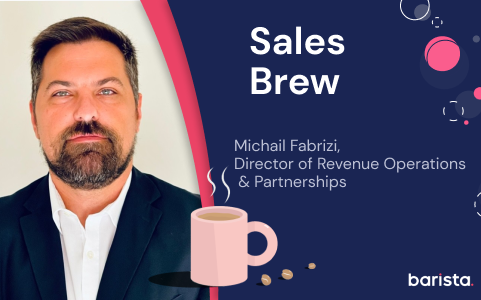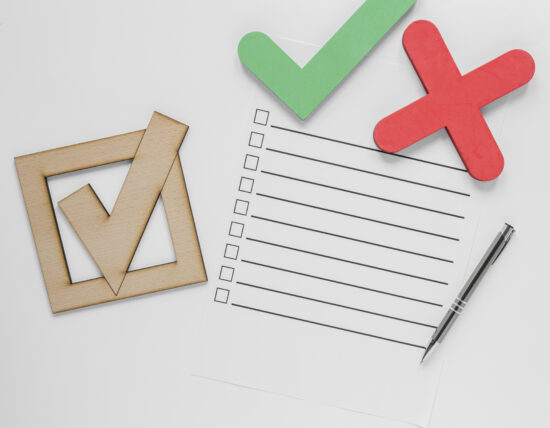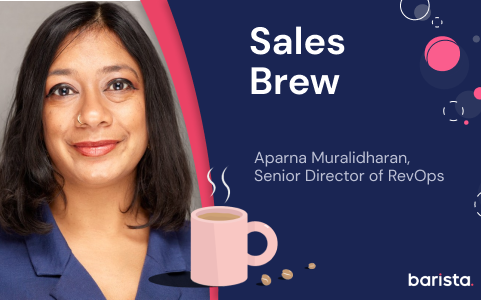Sales Brew - Salesforce data Hygiene talk with Elgun Aliyev, Salesforce Admin at CentralReach

Roy Weinstock
For the 7th episode of Sales Brew by barista AI, we had the opportunity of hosting Elgun Aliyev, a proven Salesforce Admin that understands business, and why Salesforce data hygiene is important got grow. This is a practical guide not just for Salesforce admins, but also for every revenue operations that want to transform sales culture to be more data-driven.
To watch the full interview and get updated on every sales brew episode, subscribe to our YouTube channel. A short version and transcription are below. Get a cup of coffee and enjoy the show!
What was the career journey that got you into Salesforce admin?
My journey towards becoming a Salesforce admin began over eight years ago when I first heard about Salesforce from friends. I was immediately drawn to the platform and started learning all about it. As someone with prior experience in data analysis, I quickly saw what was possible with Salesforce and what its limitations were.
What impressed me about Salesforce was its user-friendly interface and focus on user experience. As I delved deeper into it, I discovered the platform had many capabilities and possibilities. I started as a junior admin, and over time, I progressed into the real admin world, where I configured orgs.
For the past eight years, I have been a consultant, which I love because it allows me to work with many different companies from various industries. I have helped media, manufacturing, and SaaS companies to use Salesforce best practices and fine-tune their existing orgs. As a result, I have gained valuable insights into how different companies use Salesforce and how to ensure Salesforce data hygiene.
As a senior admin, I still love everything about Salesforce. It has come a long way since I first started, with consistent investments in no-code solutions such as Flow, which has evolved significantly over the years. The focus on automation has been a significant change in the platform, and I appreciate Salesforce’s commitment to providing admins with everything they need to create solutions without writing code.
My choice to become an admin was primarily due to Salesforce’s focus on no-code solutions. While I have experience writing code, I don’t want to become a developer for that reason. I believe Salesforce’s investments in no-code solutions will benefit admins and provide them with the tools they need to succeed.
Along the way, I have faced many challenges and issues with clients and users, from see level to individual contributors. However, these challenges have helped me grow as an admin and consultant, and I appreciate the opportunity to learn and improve.
What are the objectives of Salesforce admin in an organisational and how important it is to have a Salesforce admin in-house?
Great question!
When it comes to the objectives of a Salesforce admin, the most important thing is to protect the Salesforce instance and ensure that every solution and process implemented is scalable and future-proof. The admin needs to have a deep understanding of the capabilities of the system, including custom fields, relationships, reports, data orchestration and dashboards. Am admin could be a great asset for any revenue operations team structure. In addition, Salesforce data hygiene is much better when you have a dedicated Salesforce data hygiene person 🙂
The key difference between an in-house Salesforce admin and a consultant is mainly in their mindset. Regardless of their employment status, the admin should feel like they are the guardians of the Salesforce instance, responsible for protecting and maintaining it. They should focus on creating scalable to prevent CRM data leakage solutions that won’t break even with changes in the business or external factors.
Having a Salesforce admin in-house is essential for any organization that uses Salesforce as their CRM system. The admin ensures that the system is customized to meet the organization’s unique needs, helps with user adoption, manage Salesforce duplications (with CRM duplicate management tools) and provides ongoing support and training. An in-house admin can also work closely with other teams and stakeholders to identify new requirements and opportunities to optimize the system’s usage.
Overall, having a Salesforce admin with the right mindset and skills is crucial to ensure the successful implementation and maintenance of Salesforce within an organization.
What are the most urgent Salesforce challenges you’re always facing?
The challenges that Salesforce admins face are diverse, but one of the most urgent is stakeholder and data management. This, of course, impact Salesforce data hygiene as well. As an admin, you have to deal with a lot of stakeholders, who usually come from sales, marketing, customer service, and other business units. While people are flexible, processes are not, and implementing changes in Salesforce requires a system-based approach that ensures scalability, logic, and efficiency. However, stakeholders may not understand this, and it can be challenging to explain why a change that is easy to implement for a salesperson may not be scalable for the system.
To address this challenge, admins need to ask questions, understand the business, and put themselves in stakeholders’ shoes to deliver scalable solutions. This approach involves asking real questions and understanding the purpose of a change, rather than simply implementing it. For example, instead of adding a custom field to the account level, admins can suggest displaying the information in a related list on the opportunity level, which is more scalable and efficient. Overall, stakeholder management is a crucial skill for Salesforce admins, and it requires a deep understanding of the business, strong communication skills, and a system-based approach to problem-solving.
Can you elaborate on the Salesforce data hygiene protocols you have?
The Salesforce data hygiene protocols in place involve policies set for salespeople, who are considered the most challenging group to deal with. A sales enablement team is available to help salespeople understand the current policies and processes. The protocols were developed by sitting down with sales executives, sales directors, sales managers at every level of the organization, including individual sales reps who are not managers. It is important to include end-users in every decision, as the protocols, policies, and processes put in place must align with their day-to-day work to avoid failure.
The data protocols should not be created without considering the individual contributors’ needs and understanding of what they face while dealing with customers. Including the end-users in the creation of data protocols helps to ensure the accuracy of data entered into Salesforce. Without their inclusion, the data protocols are obsolete. Validation rules can be created, but they will not be effective if they do not align with the end-users’ day-to-day work.
What is the #1 tip to govern Salesforce data hygiene?
The #1 tip to govern Salesforce data is to have a good understanding of the business and to know what your data means. When dealing with data issues, it’s important to ask questions and understand why someone thinks the data is wrong before assuming it’s incorrect.
Additionally, it’s recommended to use third-party tools for data cleaning and to research the market and see what other Salesforce admins are doing. Always be willing to learn and improve yourself, as Salesforce is constantly changing and improving. Maintaining a good network of knowledgeable people in the Salesforce ecosystem, including architects and bloggers, is also crucial for staying up to date on the latest developments and solutions. By understanding the business, having the right tools, researching the market, and maintaining a good network, you can effectively govern Salesforce data.
How do you like your coffee?
Wow, that’s more challenging than talking about Salesforce data hygiene. I can talk about Salesforce nonstop, but when it comes to coffee, I prefer it just black, maybe with some chocolate. Honestly, I usually don’t drink coffee that much. I love tea. Every morning, I brew and drink black tea, and during the day as well. But if I have no option of tea, for example, in the office or somewhere where no one is going to brew tea, I have to go for coffee. When I do drink coffee, I mostly prefer it black, but sometimes with a little bit of milk. I’m not into any fancy stuff when it comes to coffee
To watch more from Sales Brew about Salesforce data hygiene more:
- Episode 1: Sales Brew with Tyler Meckes, Account manager at Dooly
- Episode 2: Morgan J Ingram, Director of Sales Execution and Evolution at JB Sales
- Episode 3: James Buckley, Chief Evangelist and Master of Ceremonies at JB Sales
- Episode 4: Nieka Mamczak, Head of Sales Enablement at StackOverflow
- Episode 5: Sam Sweeny, Sales Operations Manager
- Episode 6: Benjamin Roach, Global Sales Operations Manager at Ardoq
- Episode 7: Elgun Aliyev, Salesforce Admin at CentralReach
- Episode 8: Amanda Harwood, Sales Operations Manager
- Episode 9: Jake Rasmussen, Salesforce Consultant


